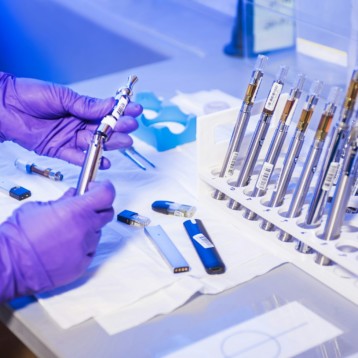|
The device, developed in Texas University, uses the technology of biomarkers to detect the cancerous cells. Cancerous cells are genetically and epi-genetically (genomic changes without the change of the DNA sequence) different from normal cells. These genetic and epi-genetic changes modify the overall set of proteins expressed in the cell, so that by using DNA, RNA and protein sensors one can differ between cancerous and healthy cells. Biomarkers mark the cancerous cells using these specific sensors. In the case of oral cancer, the sensors’ target is the EGFR protein, which is highly expressed in several types of oral cancer. The biomarker is spotted using a florescent marker attached to it.
The chip is a 22 × 30 × 8.6 mm acrylic base with a round inlet and outlet port (1 mm in diameter). The sample from the patient’s oral cavity is entered through the inlet port, then filtered and treated with the biomarker. Finally, all the biomarkers that are no
t attached to a cell are washed away and the chip is scanned for the amount of biomarker that was left inside, attached to cancerous cells. This reading is carried out using a florescent microscope. The overall time of the procedure is less than 10 minutes. The device was tested on cancerous cells and is currently being tested on tissue samples from patients with oral cancer.
‘Lab on a chip’ is a promising technology in analyzing blood and tissue samples. Recently, TFOT reported several such micro-labs, including the Nanocytometer, which can help detect patients with a high risk of developing metastasis and the Blood Test Lab-on-a-Chip developed at the California Institute of Technology for NASA. This method’s strength is in using specific biomarkers to whatever one wants to measure and in the ability to receive a fast and clear reading from the device even in a single-cell resolution.











